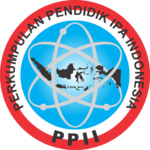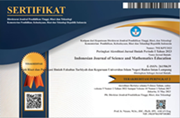Problem Based Learning (PBL) and Verbal-visual Abilities: Its Influence on Students’ Mathematics Learning Outcomes
Abstract
Keywords
Full Text:
PDFReferences
R. Alpian and Bambang Sri Anggoro, “Students’ mathematical reasoning analysis based on van hiele theory,” Indones. J. Sci. Math. Educ., vol. 03, no. March, pp. 96–105, 2020.
Steven k Reed, kognisi teori dan aplikasi. Jakarta: Selamba Humanika, 2011.
Wahyuddin, “Analisis Kemampuan Menyelesaikan Soal Cerita Matematika Ditinjau Dari Kemampuan Verbal,” BETA J. tadris Mat., vol. 2, no. 2, pp. 148–160, 2016.
N. A. Daniyati and Sugiman, “Hubungan Antara Kemampuan Verbal, Kemampuan Interpersonal, dan Minat Belajar dengan Prestasi Belajar Matematika,” Pythagoras J. Pendidik. Mat., vol. 10, no. 1, pp. 50–60, 2015.
A. Saregar and W. Sunarno, “Eksperimen Dan Demonstrasi Diskusi Menggunakan Multimedia Interktif Ditinjau Dari Sikap Ilmiah Dan Kemampuan Verbal Siswa,” J. Inq., vol. 2, no. 2, pp. 100–113, 2013.
G. R. Yuwono, I. ketut Mahardika, and A. A. Gani, “Pengaruh Model Pembelajaran Inkuiri Terbimbing terhadap Hasil Belajar Fisika Siswa (Kemampuan Representasi Verbal, Gambar, Matematis, dan Grafik) di SMA,” J. Pembelajaran Fis., vol. 5, no. 1, pp. 60–65, 2016.
S. N. P.B, “Menghadapi Generasi Visual: Literasi Visual untuk Menstimulasi Kemampuan Berpikir dalam Proses Pembelajaran,” ELSE (Elementary Sch. Educ. Journal) J. Pendidik. dan Pembelajaran Sekol. Dasar, vol. 1, no. 2a, pp. 48–59, 2017.
R. Sundayana, “Kaitan antara Gaya Belajar, Kemandirian Belajar, dan Kemampuan Pemecahan Masalah Siswa SMP dalam Pelajaran Matematika,” Mosharafa J. Pendidik. Mat., vol. 5, no. 2, pp. 75–84, 2018.
M. A. R. Meli Mardiana Patath, Bety Miliyawati, “Meningkatkan Kemampuan Berpikir Kritis Matematis dengan Model Pembelajaran VAK ( Visualization Auditory Kinestetic) dan Dampaknya Terhadap Motivasi Belajar Siswa SMA,” J. Ilm. FKIP Univ. Subang, vol. 4, no. 2, p. 170, 2018.
M. Sabirin, “Representasi dalam Pembelajaran Matematika,” JPM IAIN Antasari, vol. 1, no. July, pp. 33–44, 2019.
Rusman, model-model pembelajaran mengembangkan profesionalisme guru edisi ke dua. jakarta: Rajawali pers, 2014.
A. Irawan and G. Kencanawaty, “Peranan Kemampuan Verbal Dan Kemampuan Numerik Terhadap Kemampuan Berpikir Kritis Matematika,” AKSIOMA J. Math. Educ., vol. 5, no. 2, pp. 110–119, 2017.
Syaiful, “Metakognisi Siswa dalam Pembelajaran Matematika Realistik di Sekolah Menengah Pertama,” Edumatica, vol. 01, no. 02, pp. 1–13, 2011.
N. Mustaffa, Z. Ismail, Z. Tasir, and M. N. H. M. Said, “The Impacts of Implementing Problem-Based Learning (PBL) in Mathematics: A Review of Literature,” Int. J. Acad. Res. Bus. Soc. Sci., vol. 6, no. 12, 2016.
P. Eggen and D. Kouchak, strategi dan model pembelajaran. jakarta: PT. indeks, 2012.
C. Anwar et al., “Effect Size Test of Learning Model Arias and PBL: Concept Mastery of Temperature and Heat on Senior High School Students,” Eurasia J. Math. Sci. Technol. Educ., vol. 15, no. 3, 2019.
V. B. Gómez-Pablos, M. M. del Pozo, and A. G.-V. Muñoz-Repiso, “Project-based learning (PBL) through the incorporation of digital technologies: An evaluation based on the experience of serving teachers,” Comput. Human Behav., vol. 68, pp. 501–512, 2017.
N. W. Ashari and Salwah, “Problem Based Learning (PBL) dalam Meningkatkan Kecakapan Pembuktian Matematis Mahasiswa Calon Guru,” J. Mat. dan Pendidik. Mat., vol. 2, no. 2, pp. 100–109, 2017.
H. B. Clausen and V. Andersson, “Problem-based Learning, Education and Employability: A Case Study with Master’s Students from Aalborg University, Denmark,” J. Teach. Travel Tour., vol. 19, no. 2, pp. 126–139, 2019.
D. Kokotsaki, V. Menzies, and A. Wiggins, “Project-based learning: A review of the literature,” Improv. Sch., vol. 19, no. 3, pp. 267–277, 2016.
C. Anwar, “The Effectiveness of Problem Based Learning Integrated With Islamic Values Based on ICT on Higher Order Thinking Skill and Students’ Character,” Al-Ta lim J., vol. 23, no. 3, p. 224, 2017.
Y. Yuliana and F. Firmansah, “The Effectiveness of Problem-Based Learning With Social Media Assistance To Improve Students’ Understanding Toward Statistics,” Infin. J., vol. 7, no. 2, p. 97, 2018.
R. R. T. Wasonowati, T. Redjeki, and S. R. D. Ariani, “Penerapan Model Problem Based Learning (PBL) pada Pembelajaran Hukum-Hukum Dasar Kimia Ditinjau dari Aktivitas dan Hasil Belajar Siswa Kelas X IPA SMA Negeri 2 Surakarta Tahun Pelajaran 2013/2014,” J. Pendidik. Kim., vol. 3, no. 3, pp. 66–75, 2014.
R. Sugiarni, E. Alghifari, and A. R. Ifanda, “Meningkatkan Kemampuan Spasial Matematis Siswa dengan Model Pembelajaran Problem Based Learning berbantuan geogebra,” KALAMATIKA J. Pendidik. Mat. Vol., vol. 3, no. 1, pp. 93–102, 2018.
Y. Sayekti, “Pengaruh Problem Based Learning dengan Strategi ‘MURDER ‘ terhadap Kemampuan Pemahaman Konsep Matematis Siswa,” AlphaMath J. Math. Educ., vol. 5, no. 1, pp. 24–32, 2019.
C. E. Parasamya and A. Wahyuni, “Upaya Peningkatan Hasil Belajar Fisika Siswa melalui Penerapan Model Pembelajaran Problem Based Learning (PBL),” J. Ilm. Mhs., vol. 2, no. 1, pp. 42–49, 2017.
F. F. Fatri, M. Maison, and S. Syaiful, “Kemampuan Representasi Matematis Siswa Kelas VIII SMP Ditinjau dari Gaya Kognitif Visualizer dan Verbalizer,” J. Didakt. Mat., vol. 6, no. 2, pp. 98–111, 2019.
Y. Rafika, W. Anggraini, and R. El Fiah, “Perbandingan Model Pembelajaran Mind Mapping dan ARIAS (Assurance, relevance, Interest, Assessment, Satisfaction) terhadap Pemahaman Konsep Fisika,” Indones. J. Sci. Math. Educ., vol. 02, no. 2, pp. 210–216, 2019.
D. Gede, A. Putra, I. W. P. Astawa, and I. M. Ardana, “Pengaruh model pembelajaran blended learning terhadap pemahaman konsep dan kelancaran prosedur matematis,” J. Ris. Pendidik. Mat., vol. 6, no. 1, pp. 75–86, 2019.
B. Wulandari and H. D. Surjono, “Pengaruh Problem-Based Learning terhadap Hasil Belajar ditinjau dari motivasi belajar PLC di SMK,” J. Pendidik. Vokasi, vol. 3, no. 2, pp. 178–191, 2003.
M. M. Sulistyarini and F. G. I. Santoso, “Pengaruh Kecerdasan Visual-Spasial terhadap Hasil Belajar Matematika dalam Problem Based Learning pada Siswa SMA Kelas x,” J. Ilm. Edukasi Mat., vol. 1, no. 1, pp. 56–72, 2015.
S. Jelatu and V. S. Kurnila, “Analysis of Translation Understanding from Verbal to Visual on Trigonometry Concept,” Form. J. Ilm. Pendidik. MIPA, vol. 9, no. 3, pp. 191–202, 2019.
DOI: http://dx.doi.org/10.24042/ijsme.v3i2.6146
Refbacks
- There are currently no refbacks.
Copyright (c) 2020 Unit Riset dan Publikasi Ilmiah FTK UIN Raden Intan Lampung

This work is licensed under a Creative Commons Attribution-ShareAlike 4.0 International License.

Indonesian Journal of Science and Mathematics Education is licensed under a Creative Commons Attribution-ShareAlike 4.0 International License.




